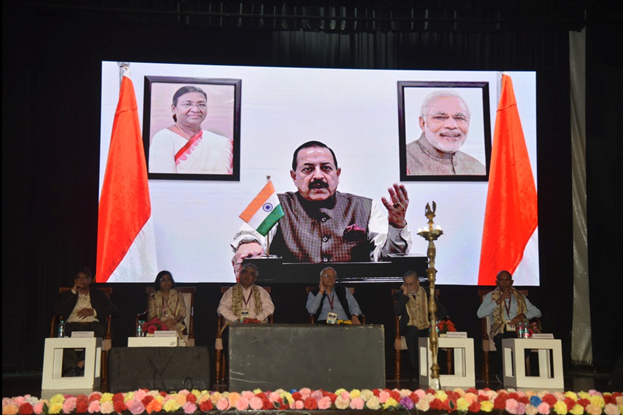Union Minister of State (Independent Charge) Science & Technology; Minister of State (Independent Charge) Earth Sciences; MoS PMO, Personnel, Public Grievances, Pensions, Atomic Energy and Space, Dr. Jitendra Singh highlighted the significant contribution of Prof. S N Bose in quantum science through a video message at the inaugural ceremony of the International Conference on Bose-Einstein Condensation, Superconductivity, Superfluidity & Quantum Magnetism organised at Kolkata.
Pointing out that the Union Cabinet of India chaired by Hon'ble PM has approved National Quantum Mission (NQM) aiming to seed, nurture and scale up scientific & industrial R&D and create a vibrant & innovative ecosystem in Quantum Technology (QT), Dr Singh described how Bose's seminal work involving four revolutionary publications led to the new quantum mechanics and became the foundation of two major Nobel prizes in 2001 and 2013.
Underlining the various initiatives of the Government of India in bringing together academia and industry to make India a global leader in quantum science and technology, the Union Minister appreciated the efforts of S. N. Bose National Centre for Basic Sciences (SNBNCBS), an autonomous institute of the Department of Science and Technology in celebrating the centenary of Bose's monumental work this year by organising 3 International conferences & several outreach activities.
The third and the final conference of the year-round celebration of Bose Einstein Statistics, namely Bose@100, brought together scientists and researchers from leading institutions across India and the world.
The Convener of the ceremony Professor Amitabha Lahiri from SNBNCBS summarised Bose's monumental work and the activities of SN Bose Center for Basic sciences.
Professor Tanushree Saha Dasgupta, Director, SNBNCBS, mentioned the profound impact of Bose's work in 1924 on the first quantum revolution and today's world of science where the second phase of the era has begun. She emphasized on the importance of young researchers of India in the global platform.
Dr. Ajai Chowdhry, Chairman, Governing Body of NQM and Founder, HCL, elaborated about the government ventures in various fields of quantum technology.
Institutes and universities across the country are working on four main areas, namely computing, communications, materials, sensing & metrology specified under the NQM, towards several goals like developing quantum computer, a secure quantum world and many more.
Professor Bertrand I. Halperin, Hollis Professor of Mathematics and Natural Philosophy, Emeritus Professor of Harvard University, mentioned how important the in distinguishability of identical particles is, in today's quantum physics, technology and information. He also connected the beautiful work of Bose Statistics in the application of non-interacting particles for studying symmetry in new quantum mechanics and in understanding magnetism related to condensed matter physics.
Professor Subir Sachdev, Herchel Smith Professor of Physics, Harvard University said that Bose's work is an example of how scientific progress is made. “A lot of brilliant ideas at their inception may not be fully understood by many, but the legacy of S.N. Bose or Luis de Broglie could be examples of such dedication and commitment towards science,” he added.
Professor Ganapathy Baskaran from IIT Madras underscored the need to utilize the finest brains in quantum science and take the field forward. He also mentioned how programs like science philanthropy can attract funding in science.































